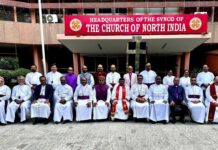The Church of Uganda has issued a statement responding to criticisms issued by a mega-church pastor who charged the church’s stance on marriage was non-biblical. Pastor Aloysius Bugingo, who is currently estranged from his wife, said the Anglican view that marriage was between one man and one woman, to the exclusion of all others, for life, was not found in the Bible.
Pastor Bugingo has made a declaration that the phrase ’till death do us part’ is not biblical, and that it is from Satan! In so doing, the pastor attacks the Roman Catholic, Anglican and Pentecostal Churches, associating them with what he calls a practice from Satan.
I can’t believe that these words are from someone who claims to be a pastor! Nonetheless, I’m not surprised that he is making such a statement after divorcing his wife on grounds of a sickness!
Bugingo claims that he has read the Bible a number of times he is not even able to count! That in itself is an interesting claim, which I wish he were humble enough not to associate himself with. Even if it was true that he has read the Bible countless times, it would be prudent for him to know that it is one thing to read even several times, but another to understand.
He states that no where does the Bible say that the married should not separate. Remember that the Bible is God’s holy, infallible, and innerant word, some versions of which he once set ablaze on an Easter Monday, claiming that they were deceptive!
Of course, for this particular statement and others of similar nature he has been making, one underlying and obvious factor, which is having a significant influence on his judgement, is his divorce, the possibility of other forms of conditioning notwithstanding. His yearning soul is in a desperate need for justification over his prejudiced separation with his bona fide wife, which, because he cannot get it by virtue of moral objectivity, he is deliberately misinterpreting the Bible, so he can justify his act – if it were possible.
Also, it is so disheartening that Bugingo is taking advantage of the innocence of those that attend him, some of whom have been blinded and/or brainwashed by his heretical eloquence that finds solace in a theological vacuum that he himself has created and made them victims of.
Let us now zoom in on the issue at hand and do a theological analysis of his claims, basing on the Bible, of which, deriving from his utterance, he is a prolific student and a voracious reader.
- Does the Bible he has read countless times have the following verses: Rom. 7:2-3; Mal. 2:13-16; Heb. 13:4; Mat. 5:32; 19:4-9; plus 1 Cor. 7:2-40, and especially verse 10 which says, “To the married I give this charge (not I, but the Lord), the wife should not separate from her husband.” Verse 11b also states clearly, “and let not the husband put away his wife.”
Again does the Bible Bugingo has read contain Gen. 2:18; Eph. 5:33; Luke 16:18, and 1 Cor. 7:39 which says, “A wife is bound to her husband as long as he lives. But if her husband dies, she is free to get married to whom she wishes, but only in the Lord”?
What is Bugingo’s interpretation of these verses, and if he has not read them, which Bible has he been reading all those countless times?!
- Consider Jesus’ command: “What God has joined together let no man put asunder” (Mat. 19:6). Has Bugingo read it? Can he define either the logical or conceptual scope of its duration? In other words, where and when does the legality of that instruction’s demand end?
- About those who are joined in marriage Jesus asserts, “they are no longer two, but one flesh” (Gen. 2:24; Mat. 19:6). How can one separate with oneself?! Looking closely at the immediate context of the verse and Jesus’ plot of thought here, one doesn’t have to be a genius or even a cultured theologian to realise that the word “therefore” which Jesus uses immediately after his assertion, is actually ‘there for something’ – to emphasize what is otherwise implied, that he (Jesus) is speaking against divorce. Actually, the words ‘no man’s in the phrase “what God has joined together, let no man separate”, speak also to the two, who are married. The husband and wife are also included in that prohibition.
There is the except clause of Mat. 5:23 that has always been looked at as Jesus’ permission to divorce. While it is true that “marital unfaithfulness” or sexual immorality can be a ground for divorce, if it happens, it comes as a regrettable consequence of an already defiled marriage, not as its approved remedy.
- Does the Bible Mr. Bugingo has read have God’s assertion “I hate divorce” in Mal. 2:16? When God says so, what does that mean for the married? Doesn’t that imply that God requires that our marriage be a lasting one? Where does a marriage whose parties won’t divorce end, if not till death separates them?
- In Eph. 5:25-33, Paul likens the marriage between a husband and wife to Christ’s relationship with the church, and commands the man to love his wife as Christ loves the church. When does Bugingo expect Christ to be separated with his ‘bride’ – the church?
When Bugingo says that the marital vows are not in the Bible. Is this to indicate that for him every activity, phenomenon, invention, and venture ought to be stated in the Bible for it to be true, right, or acceptable?
Should the Bible have stated in black and white: build cars, use computers, boil water before drinking it, form a political party, construct aeroplanes, make tarmac roads, establish hospitals, design smart phones, make jets, use treadmill and TRX bands for fitness, establish constitutions, set up universities, etc…so we know that doing such is biblical, and therefore acceptable?!
God created us in His image and gave us brains to use. In some aspects the Bible is specific and particular in accordance with both the immediate and wider contexts, but in other and actually most cases it states what is true or right in principle. What the Bible says in principle informs our conscience and so guides or facilitates our decisions and establishments.
As Christians we live by faith and reason, not faith apart from rationality, because we are commanded to love God with all our hearts, souls and minds (Mat. 22:37; Mk. 12:30, and Luk. 10:27).
- Bugingo’s reasoning that the vows compel the married to kill each other is very unfortunate. The worst of this assertion is its implication. He interprets the statement to mean, ’cause death, so you can then get married to another.’ What peace do those who divorce enjoy, after? What society would survive if the parties that make it separated at each and every misunderstanding or conflict?
Dear Aloysius, marriage survives on the classic nature of agape love as stated in 1 Cor. 13.1-9, not on a series of separation, or of murder and remarriage. Love which understands, which bears, which forgives, is the kind that sustains marriage to the end.
- Mr. Bugingo asserts that those marital vows came from Satan. Which irrefutable proof has he that their origin or author is Satan? Which evidence is there that makes such a claim valid?
May the Lord bless you for reading this. May He protect you from false and pseudo ideologies and teachings from self styled liars – enemies of the gospel and God’s infallible word. May the Holy Spirit illumine our minds and keep us alert.
Beloved, take heart.”You will know them by their fruits” (Matthew 7:16, 20).
To Him be the glory!










